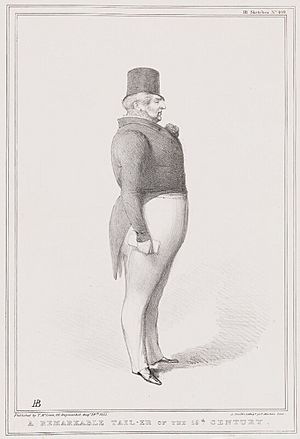William Nugent Macnamara facts for kids
William Nugent Macnamara (born around 1776, died November 11, 1856) was an important person in Ireland. He owned a lot of land and was a Member of Parliament. This meant he helped make laws for the country.
Contents
Early Life and Family
William was the oldest son of Francis Macnamara, who was also a Member of Parliament. William went to school in Dublin.
He joined the local army group called the militia. He started as a captain and later became a major. In 1798, he was chosen as the High Sheriff of Clare. This was a big job where he had to keep peace and order in his area. He did a good job during a difficult time called the Irish rebellion.
In 1815, William took over his father's lands in Doolin. He also gained Ennistymon House when he married into the Finucane family.
A Life of Travel and Politics
William traveled a lot between 1814 and 1816, even visiting other countries in Europe.
In 1815, he was involved in a famous event in Dublin. He was a "second" for Daniel O'Connell, a very important Irish leader. This meant he helped O'Connell in a formal challenge against another man, John D'Esterre.
Becoming a Member of Parliament
In 1830, William was elected as a Member of Parliament for Clare. He took the place of Daniel O'Connell, who chose to represent a different area. William was re-elected several times: in 1831, 1832, and 1847. He stopped being a Member of Parliament in 1852.
Later Life and Legacy
William Nugent Macnamara passed away in 1856. He was buried in his family's special burial place in Doolin.
He was married to Susannah Finucane. Her father was a High Court judge. William and Susannah had a son named Francis and four daughters. Their son Francis also became an Army officer and a Member of Parliament.
One of William's great-granddaughters was Caitlin Thomas. She was a writer and was married to the famous poet Dylan Thomas.
Someone who knew William described him as "a Protestant in religion, a Catholic in politics, and a Milesian in descent". This means he had his own religious beliefs, but he supported political ideas that were often linked with Catholic people in Ireland. Being a "Milesian" meant he was proud of his ancient Irish family roots.
Images for kids
 | John T. Biggers |
 | Thomas Blackshear |
 | Mark Bradford |
 | Beverly Buchanan |



